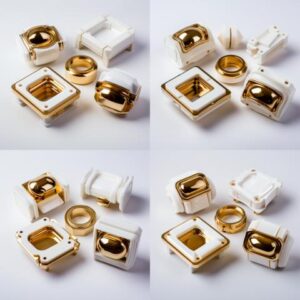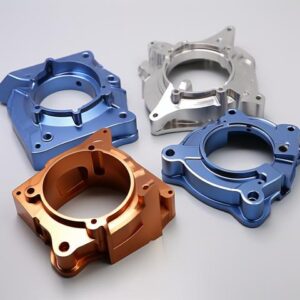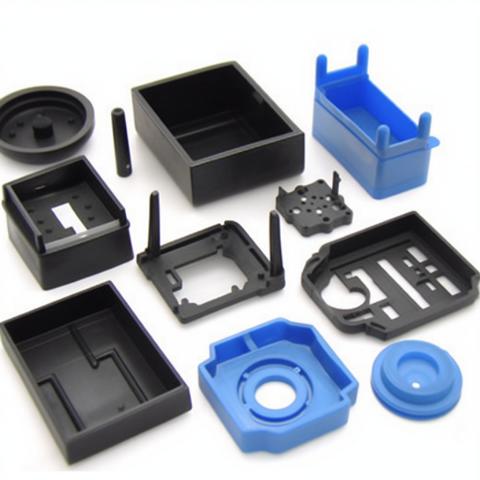Polycarbonate Plastic Injection Molding: A Powerful Tool for Diverse Applications
Polycarbonate, polycarbonate plastic injection molding, a versatile plastic known for its exceptional strength, clarity, and heat resistance, finds its way into countless everyday products. From the sleek lenses of your sunglasses to the sturdy housing of your phone, polycarbonate often owes its precise shape and functionality to a manufacturing process called injection molding.
What is Polycarbonate Injection Molding?
Imagine a sculptor, not wielding chisel and stone, but molten plastic and a precisely crafted mold. That’s the essence of injection molding. In this process, tiny plastic pellets are melted into a viscous liquid, then injected under high pressure into a cooled metal mold cavity. The molten plastic conforms to the mold’s intricate contours, solidifying into a finished part once it cools.
Polycarbonate shines in this process due to its unique properties. Its high melt strength allows it to withstand the intense pressure and heat of injection, while its rapid cooling rate ensures fast cycle times and high production volumes. This translates to cost-effective manufacturing of complex and durable parts with exceptional dimensional accuracy and surface finish.
The Intricate Dance of Polycarbonate Injection Molding:
The journey from plastic pellets to finished product is a well-orchestrated ballet of steps:
1. Mold Design and Fabrication:
The foundation of any successful plastic injection molding project lies in the mold itself. Skilled engineers meticulously design the mold cavity, factoring in the part’s geometry, wall thickness, and desired surface textures. This intricate mold, often crafted from high-grade steel or aluminum, is the maestro guiding the molten plastic into its final form.
2. Material Preparation:
Polycarbonate pellets, typically delivered in large bags, are meticulously dried to remove any moisture that could compromise the molding process. Specialized equipment then feeds these pellets into the injection molding machine, ensuring a consistent and uninterrupted flow.
3. Injection and Packing:
The heart of the process lies in the injection unit. Here, the dried pellets are melted into a molten state at precisely controlled temperatures. This molten plastic is then injected with immense pressure into the mold cavity, ensuring every nook and cranny is filled. A crucial step called “packing” follows, where additional pressure is applied to compensate for shrinkage during cooling and maintain the part’s dimensional accuracy.
4. Cooling and Ejection:
Once injected, the molten plastic rapidly cools within the mold, solidifying into the desired shape. This cooling process is carefully controlled to prevent warping or internal stresses. Finally, the mold opens, and the newly formed part is ejected, ready for the next cycle.
5. Finishing and Inspection:
Though often near-perfect, some parts might require minor finishing touches. This could involve removing sprue and gate marks, the small channels through which the molten plastic entered the mold. A rigorous quality inspection ensures each part meets the desired specifications before being shipped to its final destination.
A Polycarbonate Paradise: Applications Galore
The versatility of polycarbonate plastic injection molding, coupled with the precision of injection molding, opens doors to a vast array of applications. Here’s a glimpse into the diverse world of polycarbonate injection-molded products:
-
Automotive Industry: From sturdy headlamps and taillights to sleek instrument panels, polycarbonate’s strength and clarity make it a preferred choice for automotive components.
-
Electronics: The housings of your phone, laptop, and even the lenses of your camera likely owe their existence to polycarbonate injection molding. Its ability to withstand heat and protect sensitive electronics makes it ideal for these applications.
-
Medical Devices: From syringes and catheters to drug delivery systems, polycarbonate’s biocompatibility and sterilization resistance make it a valuable material for medical equipment.
-
Consumer Goods: From the shatterproof lenses of your sunglasses to the BPA-free bottles you sip from, polycarbonate finds its way into countless everyday products, offering a blend of durability and safety.
-
Building and Construction: Polycarbonate’s exceptional strength and weather resistance make it a popular choice for skylights, cladding panels, and even bulletproof windows.
Beyond the Basics: Considerations for Polycarbonate Injection Molding
While seemingly straightforward, polycarbonate injection molding demands careful consideration of several factors:
-
Mold Design: Optimizing the mold design for manufacturability is crucial. This involves minimizing gate marks, ensuring proper wall thickness distribution, and incorporating draft angles for smooth ejection.
-
Material Selection: Different grades of polycarbonate cater to specific needs. Choosing the right grade based on factors like heat resistance, flame retardancy, and impact strength is essential.
Processing Parameters: A Delicate Dance for Polycarbonate Perfection
The success of polycarbonate injection molding hinges not just on the machinery and molds, but also on the precise orchestration of processing parameters. These parameters, akin to dials on a conductor’s console, govern the flow and solidification of the molten plastic, ultimately influencing the part’s quality and performance.
-
Injection Pressure: Finding the sweet spot for injection pressure is crucial. Too little pressure might result in incomplete cavity filling, while too much can lead to flash (excess material) or internal stresses. Careful calculations and trials ensure the molten plastic fills the mold cavity perfectly, leaving behind a flawless part.
-
Melt Temperature: Precise temperature control is paramount. Excessively high temperatures can degrade the polycarbonate, compromising its properties and potentially damaging the mold. Conversely, inadequate temperatures can result in sluggish flow and improper filling. Finding the optimal temperature window ensures the polymer melts uniformly, flowing effortlessly into the mold without compromising its integrity.
-
Cooling Time: The rate at which the molten plastic cools within the mold significantly impacts the part’s properties. Rapid cooling minimizes shrinkage and warpage but can lead to internal stresses. Controlled cooling, often achieved through strategically placed cooling channels in the mold, strikes a balance between minimizing defects and maintaining dimensional accuracy.
-
Holding Pressure: After injection, a brief period of holding pressure is applied to compensate for the natural shrinkage that occurs as the plastic cools. This ensures the part retains its desired dimensions and maintains its structural integrity. The duration and intensity of this holding pressure are carefully calibrated to prevent overpacking and potential mold damage.
Beyond the Technical: Finishing Touches and Quality Control
Once ejected from the mold, polycarbonate parts might require some finishing touches before joining their final destinations. These final steps add polish and ensure they meet the stringent quality standards.
-
Gate and Sprue Removal: The small channels through which the molten plastic entered the mold, known as gates and sprues, are typically trimmed or punched away. This leaves behind a clean and aesthetically pleasing final product.
-
Surface Treatments: Depending on the application, additional surface treatments like polishing, texturing, or painting might be applied to enhance the part’s appearance or functionality.
-
Rigorous Inspection: Every part undergoes a thorough quality inspection to ensure it meets the specified dimensional tolerances, surface finish requirements, and functional performance criteria. This rigorous adherence to quality control guarantees that each polycarbonate injection-molded product delivered is of the highest caliber.
The Future of Polycarbonate Injection Molding: Innovation Beckons
The world of polycarbonate injection molding is constantly evolving, driven by advancements in technology and a relentless pursuit of innovation. Some exciting trends on the horizon include:
-
Multi-material Injection Molding: Combining polycarbonate with other materials within the same mold opens doors to novel functionalities and enhanced performance. Imagine a phone case with a shock-absorbing core and a scratch-resistant polycarbonate exterior.
-
Laser-Assisted Molding: Integrating laser technology into the process allows for intricate in-mold decorations, texturing, and even cutting, eliminating the need for additional post-processing steps.
-
Additive Manufacturing Integration: Combining injection molding with 3D printing techniques opens up possibilities for creating complex geometries and hybrid structures, pushing the boundaries of design and functionality.

In Conclusion: A Powerful Tool for a Polycarbonate Future
Polycarbonate injection molding is a powerful tool, transforming versatile plastic pellets into a vast array of products that enrich our lives. From the sleek lines of your phone to the sturdy components in your car, this process silently shapes the world around us. As technology advances and innovation blossoms, the future of polycarbonate injection molding promises even more exciting possibilities, paving the way for stronger, lighter, and more functional products across diverse industries. So, the next time you encounter a polycarbonate marvel, take a moment to appreciate the intricate dance of engineering, materials, and meticulous craftsmanship that brought it to life.
At Sincere Tech China mold maker, our unwavering commitment to staying at the forefront of the plastic mold industry drives us to embrace advancements and anticipate future trends. We continuously explore innovative materials and composites that offer enhanced performance and promote sustainability. By investing in ongoing research and development, we consistently deliver cutting-edge solutions that meet the evolving needs of our valued customers. As a trusted injection mold supplier in China, we take pride in our unwavering dedication to excellence.
Aligned with our sustainability goals, we place a high priority on environmentally friendly practices. We actively seek out sustainable alternatives, such as biodegradable polymers, and implement recycling initiatives to minimize the environmental impact of our manufacturing processes. By choosing our custom injection molding services, you can align your brand with sustainable manufacturing practices and contribute to a greener future.
Ensuring quality is our topmost priority, and we maintain rigorous quality control measures throughout the entire manufacturing process. Equipped with state-of-the-art facilities and staffed by skilled technicians, we subject each product to thorough inspection and testing. This guarantees exceptional performance, reliability, and customer satisfaction.
When you choose Sincere Tech as your preferred plastic mold maker in China, you can expect the highest level of professionalism, expertise, and innovation. Our dedicated team is committed to helping you bring your ideas to life, delivering superior products that excel in performance, durability, and cost-effectiveness.
Partner with Sincere Tech today and experience our relentless pursuit of excellence, as we work together to bring your vision to reality.
Our expanded capabilities include:
- Rapid Prototyping: We offer rapid prototyping services to quickly transform your concepts into tangible prototypes, allowing for iterative design improvements and accelerated product development.
- Precision Tooling: Our advanced tooling capabilities enable us to create high-quality molds with tight tolerances, ensuring consistency and precision in your injection-molded products.
- Overmolding: We specialize in overmolding, which allows for the combination of multiple materials or components, resulting in enhanced functionality, aesthetics, and durability.
- Insert Molding: Our expertise in insert molding enables us to securely encapsulate inserts within the molded parts, facilitating efficient assembly and enhancing product performance.
- Two-Shot Molding: With two-shot molding, we can produce complex, multi-material components in a single operation, reducing assembly requirements and enhancing design possibilities.
- Value-Added Services: In addition to injection molding, we offer a range of value-added services, including product assembly, packaging, and logistics support, streamlining your supply chain and reducing costs.
Partner with Sincere Tech Mould suppliers for your custom polycarbonate plastic injection molding needs, and benefit from our comprehensive capabilities, unwavering commitment to quality and sustainability, and our drive to exceed your expectations at every step of the process. Together, let’s bring your innovative ideas to life.
